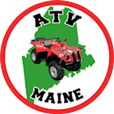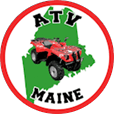The dates for the new funding for 2019 are not posted yet. Click here to get to the website from DACF and book mark it so you can get the current information when it is updated for next season
The Recreational Trails Program (RTP) is an assistance program of the U.S. Department of Transportation’s Federal Highway Administration (FHWA). The RTP provides funds to the States to develop and maintain recreational trails and trail-related facilities for motorized and nonmotorized recreational trail uses.
The Fixing America’s Surface Transportation (FAST) Act reauthorized the Recreational Trails Program (RTP) for Federal fiscal years 2016 through 2020 as a set-aside of funds from the Transportation Alternatives (TA) Set-Aside under Surface Transportation Block Grant Program (STBG).
The State of Maine has agreed to take part in the Recreational Trails Program (RTP) under the Federal Highway Administration (FHWA), the federal agency that administers the program at the national level.
The Bureau of Parks and Lands has been designated the state agency to administer the program in Maine. Within the Bureau, the Grants and Community Recreation Program provides day-to-day supervision of RTP matters.
Recreational Trails Program Financial Policies
30% of RTP funds allocated to the state shall be reserved for uses related to motorized trail recreation
30% of RTP funds allocated to the state shall be reserved for uses related to non-motorized trail recreation.
The remaining 40% of funds shall be used for recreational projects that facilitate diverse trail use.
Project Eligibility
Eligible projects may include:
Maintenance and restoration of existing recreational trails.
Development and rehabilitation of trail side and trailhead facilities and trail linkages for recreational trails.
Construction of new recreational trails.
Acquisition of easements or fee simple title to property for recreational trails or recreational trail corridors.
Operation of educational programs to promote safety and environmental protection as those objectives relate to use of recreational trails.
Who Is Eligible for RTP Grants?
The state has determined it will provide funds received under this program as grants-in-aid to municipalities, other qualified sub-divisions of state government and to qualified non-profit organizations under guidelines established by the Bureau of Parks and Lands in conjunction with the Maine Trails Advisory Committee.
How Are Grants Awarded?
All of the information and application materials are posted on this website in the column to the right. While the application itself is not overly complex, attendance at one of the regional grant workshops is recommended to help answer questions about the program and the application process.
Applications must be received by the announced deadline and must contain all required material to be eligible for possible funding. Incomplete applications will not be accepted.
Applications will be evaluated by Bureau staff and the Maine Trails Advisory Committee to determine their compliance with the established state goals for the program. All applicants will be notified whether or not they have been selected for funding.
Local Funding Share
Recreational Trails Program grants are made on a matching basis. The federal share of the project costs shall not be more than 80% (maximum grant amounts may be set by the state). The local share may consist of cash or state-approved donations of labor and/or materials.
Public Use and Access
Applications for RTP funding must stipulate full support of the program and must ensure public access to the recreation improvements funded by the grant.
Maine Goals for the Recreational Trails Program
Trails that provide linkages with existing or planned networks.
Trails that serve a wide spectrum of users.
Proposals that address landowners concerns.
Trails that provide relatively high use levels.
Proposals that provide “close-to-home” trails.
Proposals that enhance tourism and economic development.
Proposals that facilitate trail use for youngsters, seniors, and persons with disabilities.
Projects that are well planned.
Trails that are destination oriented.
Trails that further SCORP or other established planning goals.
Multiple use trail projects that address conflicts between user groups.
Proposals that have adequate matching resources.
Proposals that consider operation and maintenance needs.
Projects that leverage other private and public funding sources.
Projects that rehabilitate existing, well-used trails.
Projects that preserve rights-of-way for public recreation purposes.
Trails that provide high levels of user safety.
Trails that provide aesthetic or cultural benefits to users.
Projects that provide for reasonable longevity.


Leave A Comment